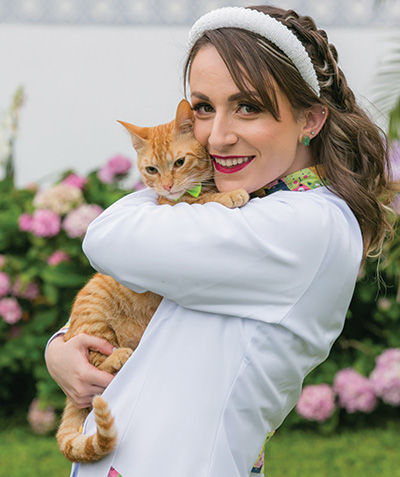

For microbiology resident Tayna Padilha Basqueroto, the journey from Brazil to the Michigan State University Veterinary Diagnostic Laboratory was one marked by diverse interests, achievements, personal loss, and ambition.

After completing a professional course in electrotechnics, the study of the applications of electricity, Basqueroto studied veterinary medicine at the University of Southern Santa Catarina in Brazil, where she was awarded a scholarship to study alongside an expert in wildlife veterinary medicine. That experience gave her an opportunity to collaborate on projects exploring the health and ecology of jaguars and pumas, including blood typing for both species, and shaped her academic journey. After completing her DVM degree, Basqueroto completed a specialized program in veterinary medicine for wildlife.
Basqueroto’s interest in microbiology was fueled by the COVID-19 pandemic. “The ability of these microscopic organisms to cause devastating diseases, and the intricate dance between pathogens and their hosts, captured my curiosity. More than that, the pandemic made me realize that infectious diseases do not discriminate; they can affect anyone.”
She chose to pursue a residency in microbiology with a goal to actively contribute to research and development of effective strategies against infectious diseases, not only in times of crisis but for long-term promotion of public health.
“My motivation is not solely academic; it is deeply personal. The pandemic robbed me of the joy of being alongside someone I loved. The microbiology residency is my way of honoring that story, of turning sorrow into action,” Basqueroto says.
“My decision is guided by the memory of those we’ve lost and the hope that through a profound understanding of microbes and their interaction with humans, we can build a safer and healthier future for all.”
It should not be a surprise that Basqueroto’s special area of interest is zoonotic diseases, those that affect both animals and humans, such as SARS-CoV-2, the virus that causes COVID-19 in people.
Her residency at the MSU Veterinary Diagnostic Laboratory, sponsored by DPI Global, provides her with opportunities to achieve her objectives through analyzing samples, conducting diagnostic tests, interpreting results, and collaborating with a team of experts.
“What I find most rewarding about my work is the sense of contribution to animal and human health. Knowing that my work plays a role in preventing the spread of diseases and improving the well-being of animals and people brings a strong sense of purpose,” says Basqueroto.
Following her residency, Basqueroto plans to continue her studies by pursuing a PhD in microbiology with a goal to deepen her knowledge in the field and work with infectious diseases.
While she might be a long way from home with a long road ahead of her, Basqueroto isn’t alone on her journey.
“I have an orange cat named Klaus who came with me all the way from Brazil. I found him during
my internship at the peak of the COVID pandemic. Klaus holds a special place in my heart due to his unique journey into my life.
He serves as a reminder of the unexpected connections that
life can bring, and I’m incredibly grateful for the comfort and happiness he brings to my home.” 
Know of a UME? Contact the MSU VDL (517.353.1683) or USDA (aphis.ume@usda.gov).
Editor’s Note: A version of this article was published in the Fall 2023 issue of The Michigan Veterinarian, published by the Michigan Veterinary Medical Association.